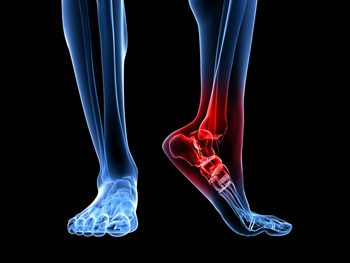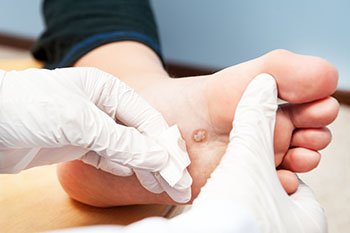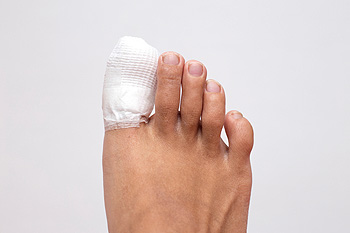Connect With Us
Blog
Items filtered by date: November 2021
Common Causes and Treatments for Heel Pain
 Because heel pain can be both debilitating and affect your everyday routine, it is important to have a podiatrist assess your condition. There are a variety of different sources of heel pain, and the most common one is plantar fasciitis. This occurs when the plantar fascia, which is a band of tissue that runs along the bottom of the foot connecting the heel to the toes, becomes inflamed or torn. Other factors, such as arthritis, an Achilles tendon injury, a stress fracture, or fat pad atrophy, can all lead to heel pain as well. Common methods that a podiatrist may use to treat heel pain include ice, cortisone injections, anti-inflammatory drugs, orthotics, or even surgery. Patients who are struggling with heel pain should consult with a podiatrist for a diagnosis and treatment plan.
Because heel pain can be both debilitating and affect your everyday routine, it is important to have a podiatrist assess your condition. There are a variety of different sources of heel pain, and the most common one is plantar fasciitis. This occurs when the plantar fascia, which is a band of tissue that runs along the bottom of the foot connecting the heel to the toes, becomes inflamed or torn. Other factors, such as arthritis, an Achilles tendon injury, a stress fracture, or fat pad atrophy, can all lead to heel pain as well. Common methods that a podiatrist may use to treat heel pain include ice, cortisone injections, anti-inflammatory drugs, orthotics, or even surgery. Patients who are struggling with heel pain should consult with a podiatrist for a diagnosis and treatment plan.
Many people suffer from bouts of heel pain. For more information, contact Michael Tomey, DPM of Cary Foot & Ankle Specialists. Our doctor can provide the care you need to keep you pain-free and on your feet.
Causes of Heel Pain
Heel pain is often associated with plantar fasciitis. The plantar fascia is a band of tissues that extends along the bottom of the foot. A rip or tear in this ligament can cause inflammation of the tissue.
Achilles tendonitis is another cause of heel pain. Inflammation of the Achilles tendon will cause pain from fractures and muscle tearing. Lack of flexibility is also another symptom.
Heel spurs are another cause of pain. When the tissues of the plantar fascia undergo a great deal of stress, it can lead to ligament separation from the heel bone, causing heel spurs.
Why Might Heel Pain Occur?
- Wearing ill-fitting shoes
- Wearing non-supportive shoes
- Weight change
- Excessive running
Treatments
Heel pain should be treated as soon as possible for immediate results. Keeping your feet in a stress-free environment will help. If you suffer from Achilles tendonitis or plantar fasciitis, applying ice will reduce the swelling. Stretching before an exercise like running will help the muscles. Using all these tips will help make heel pain a condition of the past.
If you have any questions please contact our office located in Cary, NC . We offer the newest diagnostic and treatment technologies for all your foot and ankle needs.
The Formation of Ingrown Toenails
 When a curved toenail begins to grow into the skin on the sides of the nails, it digs into the skin and the skin grows around it, which results in pain, redness, and swelling. This is known as an ingrown toenail. Ingrown toenails can form due to genetic factors, trauma to the toe, improperly trimmed toenails (make sure they are cut straight across), or shoes that are too tight. If the ingrown toenail is severe enough, it can become infected, which is often indicated by drainage and a bad odor. Patients with ingrown toenails should consult with a podiatrist if they have diabetes, the nail is infected, or they have recurring ingrown toenails. A podiatrist will look to find the best treatment option for the nail (which may include surgery) and treat any potential infection.
When a curved toenail begins to grow into the skin on the sides of the nails, it digs into the skin and the skin grows around it, which results in pain, redness, and swelling. This is known as an ingrown toenail. Ingrown toenails can form due to genetic factors, trauma to the toe, improperly trimmed toenails (make sure they are cut straight across), or shoes that are too tight. If the ingrown toenail is severe enough, it can become infected, which is often indicated by drainage and a bad odor. Patients with ingrown toenails should consult with a podiatrist if they have diabetes, the nail is infected, or they have recurring ingrown toenails. A podiatrist will look to find the best treatment option for the nail (which may include surgery) and treat any potential infection.
Ingrown toenails may initially present themselves as a minor discomfort, but they may progress into an infection in the skin without proper treatment. For more information about ingrown toenails, contact Michael Tomey, DPM of Cary Foot & Ankle Specialists. Our doctor can provide the care you need to keep you pain-free and on your feet.
Ingrown Toenails
Ingrown toenails are caused when the corner or side of a toenail grows into the soft flesh surrounding it. They often result in redness, swelling, pain, and in some cases, infection. This condition typically affects the big toe and may recur if it is not treated properly.
Causes
- Improper toenail trimming
- Genetics
- Improper shoe fitting
- Injury from pedicures or nail picking
- Abnormal gait
- Poor hygiene
You are more likely to develop an ingrown toenail if you are obese, have diabetes, arthritis, or have any fungal infection in your nails. Additionally, people who have foot or toe deformities are at a higher risk of developing an ingrown toenail.
Symptoms
Some symptoms of ingrown toenails are redness, swelling, and pain. In rare cases, there may be a yellowish drainage coming from the nail.
Treatment
Ignoring an ingrown toenail can have serious complications. Infections of the nail border can progress to a deeper soft-tissue infection, which can then turn into a bone infection. You should always speak with your podiatrist if you suspect you have an ingrown toenail, especially if you have diabetes or poor circulation.
If you have any questions, please feel free to contact our office located in Cary, NC . We offer the newest diagnostic and treatment technologies for all your foot care needs.
Do You Suffer From Painful Feet?
The Basics of Diabetic Foot Care
If you or someone you take care of has diabetes, there are a number of preventative practices that should be implemented to help keep your feet healthy and to avoid serious complications down the road. Shoes and socks should be worn during waking hours, even around the house. Check to make sure shoes fit properly and that there are no rough edges that will scrape against or cause a disturbance in the skin. Examine the feet daily. Early detection of any break in the skin will help avoid the injury from developing into a wound. Keep the feet clean and dry and the toenails trimmed straight across. Toenail length should be level with the tips of the toes, but not too short in order to prevent the nail from growing into the skin. Finally, any diabetic should be under the care of a podiatrist who can help them maintain proper foot health and manage any complications should they arise.
Diabetic foot care is important in preventing foot ailments such as ulcers. If you are suffering from diabetes or have any other concerns about your feet, contact Michael Tomey, DPM from Cary Foot & Ankle Specialists. Our doctor can provide the care you need to keep you pain-free and on your feet.
Diabetic Foot Care
Diabetes affects millions of people every year. The condition can damage blood vessels in many parts of the body, especially the feet. Because of this, taking care of your feet is essential if you have diabetes, and having a podiatrist help monitor your foot health is highly recommended.
The Importance of Caring for Your Feet
- Routinely inspect your feet for bruises or sores.
- Wear socks that fit your feet comfortably.
- Wear comfortable shoes that provide adequate support.
Patients with diabetes should have their doctor monitor their blood levels, as blood sugar levels play such a huge role in diabetic care. Monitoring these levels on a regular basis is highly advised.
It is always best to inform your healthcare professional of any concerns you may have regarding your feet, especially for diabetic patients. Early treatment and routine foot examinations are keys to maintaining proper health, especially because severe complications can arise if proper treatment is not applied.
If you have any questions please feel free to contact our office located in Cary, NC . We offer the newest diagnostic and treatment technologies for all your foot and ankle needs.
How to Spot a Plantar Wart on Your Child’s Feet
The human papillomavirus (HPV) is a group of viral infections. When a certain type of HPV attacks skin on the soles of the feet, plantar warts may develop. It is generally believed that children are more likely than adults to develop plantar warts because they are more likely to go barefoot, have broken skin, or come in contact with infected surfaces in locker rooms and on playground equipment, towels, or other surfaces where HPV may be lurking. If you notice thick, callus-like areas on the bottom of your child’s feet, they may have plantar warts. They are typically flat and round and may be grey or brown with a grainy texture and ridged border—all of which helps distinguish them from regular calluses. You may even see a tiny black dot in the center of the wart, which is actually a clotted capillary. Plantar warts are often painful when walking or otherwise applying pressure on the bottom of the foot. If your child is complaining about pain on the sole of their foot or you detect something that looks like a plantar wart, it is best to seek the care of a podiatrist, as these hearty, contagious warts may spread and cluster, and are typically resistant to home remedies.
Plantar warts can be very uncomfortable. If you need your feet checked, contact Michael Tomey, DPM from Cary Foot & Ankle Specialists. Our doctor will assist you with all of your foot and ankle needs.
About Plantar Warts
Plantar warts are the result of HPV, or human papillomavirus, getting into open wounds on the feet. They are mostly found on the heels or balls of the feet.
While plantar warts are generally harmless, those experiencing excessive pain or those suffering from diabetes or a compromised immune system require immediate medical care. Plantar warts are easily diagnosed, usually through scraping off a bit of rough skin or by getting a biopsy.
Symptoms
- Lesions on the bottom of your feet, usually rough and grainy
- Hard or thick callused spots
- Wart seeds, which are small clotted blood vessels that look like little black spots
- Pain, discomfort, or tenderness of your feet when walking or standing
Treatment
- Freezing
- Electric tool removal
- Laser Treatment
- Topical Creams (prescription only)
- Over-the-counter medications
To help prevent developing plantar warts, avoid walking barefoot over abrasive surfaces that can cause cuts or wounds for HPV to get into. Avoiding direct contact with other warts, as well as not picking or rubbing existing warts, can help prevent the further spread of plantar warts. However, if you think you have developed plantar warts, speak to your podiatrist. He or she can diagnose the warts on your feet and recommend the appropriate treatment options.
If you have any questions please feel free to contact our office located in Cary, NC . We offer the newest diagnostic and treatment technologies for all your foot and ankle needs.
Is My Stubbed Toe Serious?
Stubbing your toe can be incredibly painful. In most cases, the pain subsides after a minute or two. In other cases, what seems like a simple stubbed toe can become an intensely painful and increasingly worsening injury. If your toe pain gets worse over the course of several hours and your toe is swollen, bruised, deformed, or numb, you may have a broken toe bone and should seek medical care immediately. If you have pain, swelling, bruising, and felt a popping sensation at the time of injury, you may have a toe sprain. You can also injure your toenail when stubbing your toe, which can make blood pool under the nail and cause pain and pressure in the toenail. If you have stubbed your toe and are concerned about the injury, it is suggested that you schedule an appointment with a podiatrist.
Broken toes may cause a lot of pain and should be treated as soon as possible. If you have any concerns about your feet, contact Michael Tomey, DPM from Cary Foot & Ankle Specialists. Our doctor will treat your foot and ankle needs.
What Is a Broken Toe?
A broken toe occurs when one or more of the toe bones of the foot are broken after an injury. Injuries such as stubbing your toe or dropping a heavy object on it may cause a toe fracture.
Symptoms of a Broken Toe
- Swelling
- Pain (with/without wearing shoes)
- Stiffness
- Nail Injury
Although the injured toe should be monitored daily, it is especially important to have a podiatrist look at your toe if you have severe symptoms. Some of these symptoms include worsening or new pain that is not relieved with medication, sores, redness, or open wounds near the toe.
If you have any questions, please feel free to contact our office located in Cary, NC . We offer the newest diagnostic and treatment technologies for all your foot care needs.




